
 |
|
|
#1 |
|
Member
Join Date: Aug 2009
Posts: 338
|
Hello all! My Name is Dave and I'm new to this forum. I come because of current members Kukulza28, Ferguson, and Bill Marsh, who have repeated countless times how interesting and informative this forum can be.
I'd like to start my initial post by inquiring about something. My interests in Moro weapons leads me to wonder about a less than common style of kris, one with a blade that is less broad than what is typically the norm. Another striking characteristic involes the tip, as a lot of them seem to be more pointed than the rounded tips of the broader blades. What are its origins? Does it predate the more commonly seen broad bladed kris, or is it a characteristic of a certain group of moro tribe? I once read that this certain type is a 'transition' from the indonesian style kris to the one we're familiar with the moros using. Is there any truth to this? Perhaps it would help if I posted some pictures of reference for discussion purposes. Here are pictures I have compiled of this variety of kris over the years. I have found at least three varieties: This one we'll call "Type 1" for classification purposes. The waves are spread out wider and run up the kris further. Typically I see that there are five waves but this sstyle could exceed that number. The talismanic symbols at the base of the blade are very reminiscent of an indonesian Keris, being more like deep and thin fullers (or 'bloodgrooves' or however you woiuld label them) rather than shallow and wider engravings:   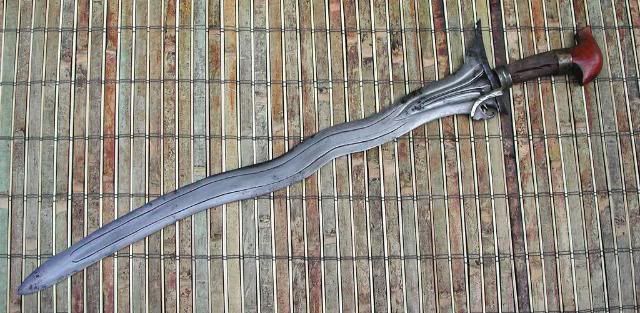 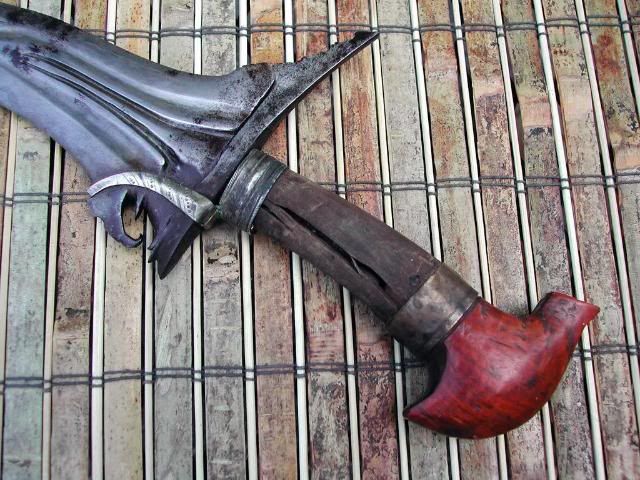 Next is what i will label as "Type 2". I'm not sure if these are younger or older than type 1 kris, but they're intersting to see. They typically have the same characteristics of Type 1 but with Three Waves instead of five or more: 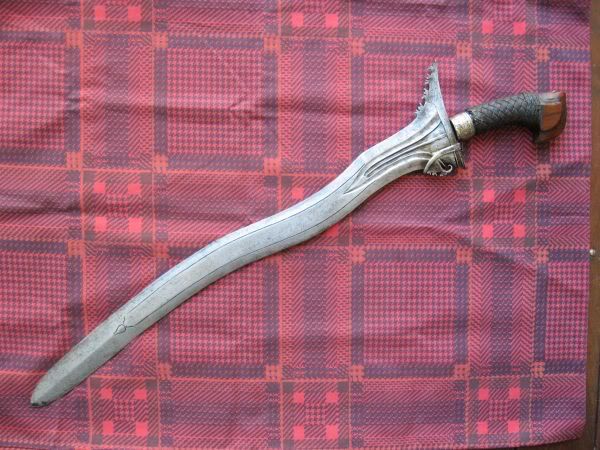 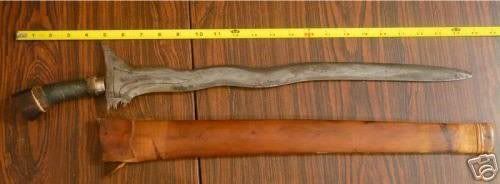 Last is what I believe to be the youngest of these kris. I'll label these type 3. The talismanic engravings in the middle base of the blade here seem more shallow than type 1, Are shorter and wider, and end more abruptly; sometimes ending in rectangular ends rather than a gradual slope to a point. This seems more typical of the more recent kris except that these kris are, again, skinny bladed: 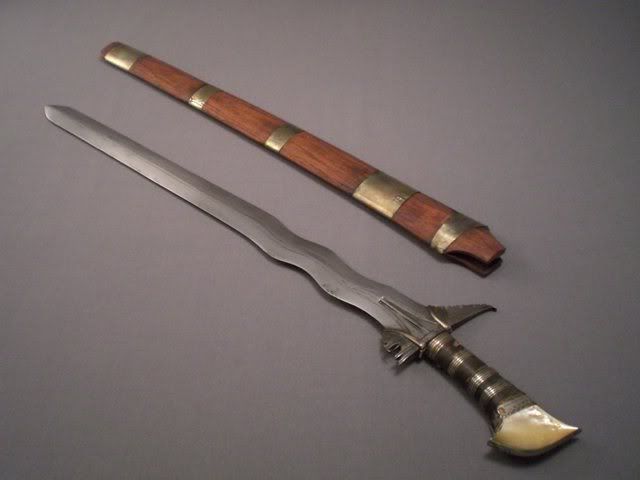 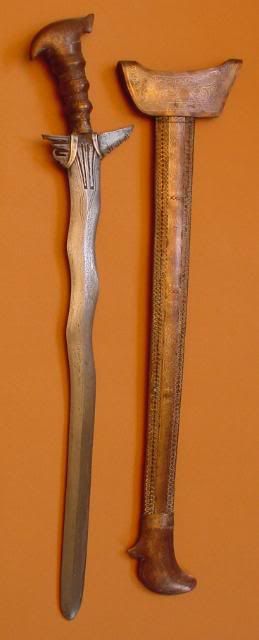 Any thoughts? Comments? Insights? I would love to pick oll of your brains and hear what you have to say. Last edited by ThePepperSkull; 26th August 2009 at 07:32 PM. |
|
|

|
|
|
#2 |
|
EAAF Staff
Join Date: Dec 2004
Location: Louisville, KY
Posts: 7,217
|
According to Cato (Moro Swords) the type 1 is the earliest and your classification would seem correct. All but the last 2 are Sulu, with the last 2 being Maguindanao and perhaps Maranao respectively. The last one is very recent.
You could do a search on this forum for this type of discussion in the past 5 years - very lively and informative. Also reading Cato's book would be a great starter as well. Welcome to the forum and a great question. |
|
|

|
|
|
#3 |
|
Member
Join Date: Aug 2009
Posts: 338
|
Thanks for the reccomendation, I'm looking up past discussions as we speak! I'm quite new at identifying classifications of kris, so that (The I.D.'ing of which was sulu, maguindanao, maranao kris) was very helpful. I've heard that once you get going, people eventually can identify which kris belongs to which group just by taking a look at it, sort of akin to how people can tell what company a car model belongs to before actually seeing the logo on it.
I'm still trying to track down a copy of Cato's book on moro kris. I believe they're out of print so they're not so easy to track down (At least not for a reasonable price, haha). Last edited by ThePepperSkull; 26th August 2009 at 08:01 PM. |
|
|

|
|
|
#4 |
|
Member
Join Date: Oct 2008
Location: between work and sleep
Posts: 731
|
Nice to see ya here Pepperskull! Really look through the old threads, it may take days, but there's a lot of fascinating info. Though they make me want to visit and handle all the kris being shown and discussed...
 
|
|
|

|
|
|
#5 | |
|
Member
Join Date: Aug 2009
Posts: 338
|
Quote:
I'm currently having a replica made inspired by that particular blade. It's not going to look entirely historically accurate since it's not being made anywhere near mindanao. It's being made in Luzon but I'll be looking into modifying its appearance once I know more in-depth about the talismanic gangya carvings. It will be monosteel and be through-hardened as opposed to folded and differentially hardened but my intentions of it are to use it for tameshigiri-like cutting practice. I don't collect antiques due to a family tradition forbidding as such, and even if I did I would never think to test cut with the real thing. |
|
|
|

|
|
|
#6 | |
|
EAAF Staff
Join Date: Dec 2004
Location: Louisville, KY
Posts: 7,217
|
Quote:
Anyway, this particular one is not traditional since it is covered all in copper with silver overlay/inlay. It was made for the market and very recent. |
|
|
|

|
|
|
#7 |
|
Member
Join Date: Aug 2009
Posts: 338
|
Did you mean the last one? It does look quite like tourist-bait.
In the post beforehand though, I was refering to the one above it with what appears to be an ivory pommel in a simplified kakatua shape. I'm having that general style of kris semi-replicated. I've always loved the look of the more utilitarian and practical kris that would have been carried in battle than the more ornamental ones that older Datus were seen wearing. |
|
|

|
|
|
#8 |
|
EAAF Staff
Join Date: Dec 2004
Location: Louisville, KY
Posts: 7,217
|
The one above it is antique though later with a Mother-of-Pearl pommel, not ivory. Can fool you though through the pictures. That one is Maguindanao and perhaps early 20th century, perhaps a little later.
|
|
|

|
 |
|
|